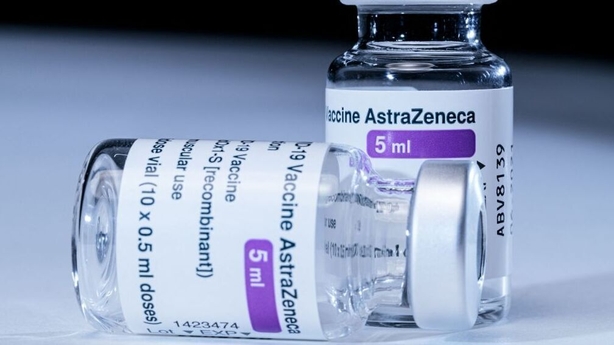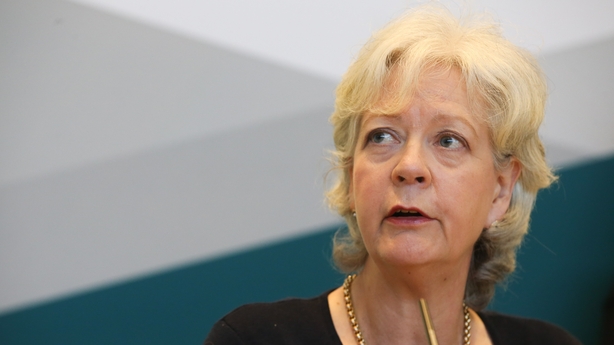The National Public Health Emergency Team has said that the AstraZeneca Covid-19 vaccine can continue to be used in Ireland, following advice from the National Immunisation Advisory Committee.
It follows a temporary suspension since last Sunday morning on the use of the vaccine in Ireland, following reports of unusual blood clots in Norway.
Earlier this week, an investigation by the European Medicines Agency concluded that the vaccine is not associated with an increase in the overall risk of blood clots in those who receive it, but that it may be associated with very rare clots in vessels draining blood from the brain. It said the benefits of the vaccine continue to outweigh the risk of side effects.
The HSE has said it will resume administering the vaccine tomorrow.
Chief Clinical Officer Dr Colm Henry welcomed the positive outcome to the review by the EMA, saying the HSE will now "begin rescheduling vaccinations starting with a relatively modest number tomorrow".
People being invited for vaccination with the AstraZeneca jab are in the high risk category, and so the HSE has advised that people attend their appointment "as soon as it is offered to you".
Speaking this evening, Deputy Chief Medical Officer Dr Ronan Glynn said that based on assessments undertaken by the EMA and NIAC, he could recommend the resumption of the vaccine in Ireland.
Asked what he would say to people who are due to get the AstraZeneca #Covid19 vaccine, Deputy CMO Dr @ronan_glynn says 'I would urge anyone now who is offered the vaccine to take it. We know that it's an extremely effective vaccine' | Live blog: https://t.co/ZJpPg24qJv pic.twitter.com/7kdQgxdmBj
— RTÉ News (@rtenews) March 19, 2021
Dr Glynn said that the HSE will now work to recommence the administering of the vaccine around the country.
"It is a safe vaccine, it is an effective vaccine. We can see the effectiveness in case loads in other jurisdictions. We are lucky to have it," he said.
To date, no reports of serious clotting events similar to those seen in Norway have been seen in Ireland, Dr Glynn said.
More than 117,000 doses of the AstraZeneca vaccine have been administered in Ireland so far.
NIAC has said it is recommending that the vaccine be administered to all age groups over 18, and "strongly encouraged" those who are due to receive it in the following days and weeks to take the opportunity.
"The best vaccine that anyone can receive is the one that they can receive soonest," it said.
The committee has also recommended that healthcare professionals and vaccine recipients should be informed that "very rare, complicated clotting events have been reported in a small number of people who have recently received the AstraZeneca vaccine".
We need your consent to load this rte-player contentWe use rte-player to manage extra content that can set cookies on your device and collect data about your activity. Please review their details and accept them to load the content.Manage Preferences
Read more:
Latest coronavirus stories

The Health Products Regulatory Authority has said the vaccine is safe for use, and will now come with an information leaflet warning of potential rare side effects linked to blood clotting.
Dr Glynn said it took less than 24 hours for health authorities here to decide to resume use of the vaccine.
"It is less than 24 hours since our NIAC and their counterparts all across Europe conferred on the outcome of the investigation.
Asked if people might be able to choose another vaccine if they turn down the AstraZeneca vaccine, Prof Karina Butler says 'The vaccines are being rolled out and being used ... almost as soon as they arrive in the country; there's very high uptake. There's no spare capacity.' pic.twitter.com/PUxmgaLd0g
— RTÉ News (@rtenews) March 19, 2021
"It's less than 24 hours since our Health Products Regulatory Authority, and NIAC conferred and our clinician colleagues, who work with specialists in these areas conferred, discussed looked at the data.
"They met last night, they met this morning, they provided recommendations to me this afternoon.
"The minister has accepted those recommendations and the HSE is meeting as we speak to organise the commencement of the programme."
NIAC Chair Professor Karina Butler said the public "should be reassured by the swift and thorough investigations into a very small number of serious but very rare adverse events", adding that the safety of vaccines was paramount.

Prof Butler said: "Problems with clotting are commonly seen in those with severe Covid-19 disease. They can also occur by chance in the general population.
"The EMA found no evidence that the vaccine caused these reported events and are continuing investigation into a possible association.
"These events have predominantly occurred in women under 55 years of age.
"However, as this may reflect targeted vaccination of healthcare workers to date, NIAC recommends that appropriate guidance be made available to all vaccine recipients and healthcare providers.
"The public should be reassured by the fact that over 20 million doses of this vaccine have been given in the EEA and the UK providing protection to those who have received it.
"We are seeing that the rate of infections and hospitalisations are beginning to reduce amongst those who are vaccinated."

